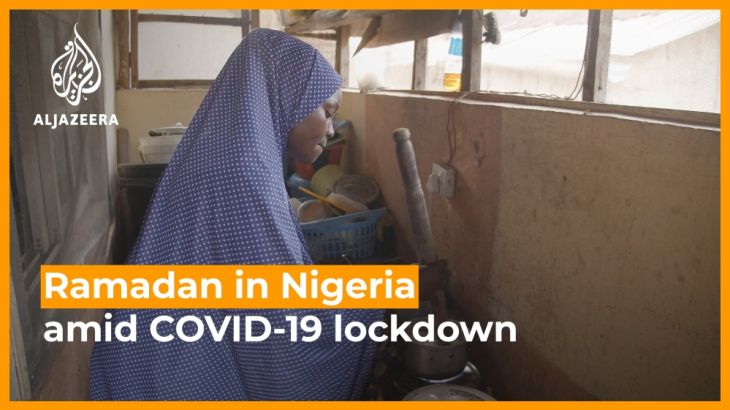
Ramadan in Nigeria amid coronavirus lockdown
‘It’s not possible for me to fast without food.’ How Ramadan in Nigeria is affected by coronavirus restrictions.
Observance of the Muslim holy month of Ramadan is changing for many people in Abuja, Nigeria amid the coronavirus pandemic.
With a lockdown implemented to reduce the spread of COVID-19, markets are only open twice a week, for a few hours.
Keep reading
list of 4 itemsMexico’s teachers seek relief from pandemic-era spike in school robberies
‘A bad chapter’: Tracing the origins of Ecuador’s rise in gang violence
Why is the US economy so resilient?
Those who are unable to buy enough food to last them for the rest of the week are struggling to maintain their fast this Ramadan.
“We can stay at home, but what are we going to eat at home?” Abdulsalam Saidat Adenike, a businesswoman, told Al Jazeera.
“Even the people you are seeing in the market, it’s people that have money to buy it. Some people are at home without getting one cup of rice to eat. It’s not possible for me if I don’t have food. I can’t fast. Because I need to eat food at midnight and when we open fast we need to eat also, twice in the day. So it’s not possible for me to fast without food.”
Abuja has been under lockdown since March 30 and these restrictions have cost many people their jobs, leaving families struggling without an income.
However, the government has reportedly started to gradually ease lockdown measures in the capital city. It also announced that families in need would receive monthly cash stipends and food packages. But some families say they have not received any assistance.
With the largest Muslim population in West Africa, many in Nigeria say the lockdown has left them vulnerable during the holy month.
“This lockdown we are in has truly troubled us because there is no work, no food, I have a wife and children and the Ramadan season is here how can we feed our family when there is no money,” Bilyaminu, a mechanic, asked.
“We are being restricted from working, if your money is finished you stay and look at people, children are crying for food, there is no food. What has the government done to help the people? Nothing. It’s said that supplies were given to the people, how will we know that it was given because we have not gotten anything if we have received help it would be different.”
Ramadan usually involves community gatherings, such as communal prayers and iftars, which have all been curtailed by COVID-19 restrictions. Most mosques are now livestreaming their sermons online.
Nigeria currently has more than 4,150 confirmed coronavirus cases and 128 deaths, according to data compiled by Johns Hopkins University.
This report was produced and edited by Al Jazeera NewsFeed’s Seena Khalil in Doha, Qatar, and filmed by Simpa Samson in Abuja, Nigeria.